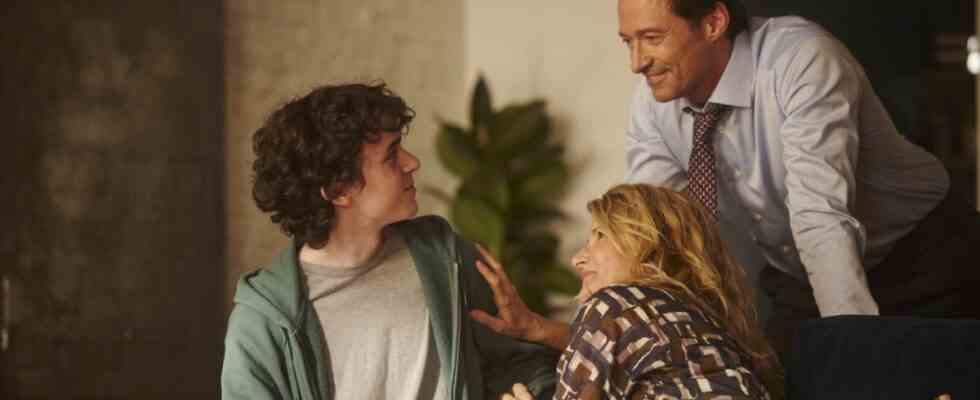As strenuous as it can sometimes be with the concentrated art of film, occasionally you also experience very casual moments of happiness. For example, when you are allowed to look out onto the very blue Gulf of Venice with Vanessa Kirby and philosophize about the old rule of theater dramaturgy, according to which a weapon that is mentioned in the dialogue must also go off later in the play.
“Ah, Chekhov’s gun!” she exclaims. She spent five years on the stages of London before becoming Princess Margaret in the Netflix series The Crown and opposite of Tom Cruise in the Mission Impossible series. In 2020 she won the Coppa Volpi as best actress in Venice for the feature film “Pieces of a Woman”.
As a result, Kirby is naturally thrilled to be back at the Lido, and she gets to say the key phrase about the gun in her competition film “The Son,” Florian Zeller’s new work. The French novelist and playwright has also been an aspiring film director for the past two years. He successfully transforms his very psychological plays into English-language star cinema. First up was The Father, in which Anthony Hopkins lost himself to dementia and won an Oscar, and now comes The Son, starring Hugh Jackman, Laura Dern and Vanessa Kirby – and Anthony Hopkins again.
The hunting weapon in the bathroom should not remain just a decoration in “The Son”
It is not possible to say exactly who the eponymous son is in this constellation. Peter (Jackman) has suffered all his life from the coldness of his father (Hopkins), who was a political bigwig in Washington. Nevertheless, something has become of him: He is a partner in a large New York law firm. He’s also divorced and in a relationship with a new young woman (Kirby) and their baby. His life gets out of step when his seventeen-year-old son from his first marriage suddenly fails at school and moves back in with him. Soon it’s impossible to ignore that something is wrong with the boy – so badly that a long-forgotten hunting weapon stowed away in the bathroom suddenly becomes difficult to think about.
You can feel tragedy rolling in, a familiar feeling in this competition in Venice. Even if it begins rather cheerfully and oddly, as in Martin McDonagh’s “The Banshees of Inisherin”, which is set on a barren island off the mainland at the time of the Irish Civil War. There’s gnarly island violinist Colm, played by Brendan Gleeson, and good-natured farmer Pádraic, played by Colin Farrell – best pub buddies of all time. Until one day Colm says he doesn’t like Pádraic anymore and doesn’t want anything to do with him anymore.
Best pub buddies, at least so far: Colin Farrell and Brendan Gleeson in The Banshees of Inisherin.
(Photo: dpa)
No one on the island really takes this whimsy seriously, including Pádraic, but that’s exactly the point of the film. Because in the hands of a master storyteller like McDonagh (“Three Billboards Outside Ebbing, Missouri”) you just believe that Irish stubbornness doesn’t dissolve so easily. On the contrary, it can increase further at any time until fingers are cut off, houses burn and the banshees, the Irish dead fairies, sing their dirge. It ends up being the most unusual meditation on fratricidal war imaginable. The former friends are unforgiving and don’t even know why anymore.
“The Eternal Daughter” won’t be a funny movie either, as the very first scene makes that clear. A car drives through a foggy night in Wales, it goes to a magnificent lonely country house, which the driver immediately tells you is haunted. The fatefully broad string surfaces on the soundtrack are already applying for the Bernard Herrmann Memorial Prize. The old house turns out to be a hotel that no longer has guests, but now mother and daughter, both played by Tilda Swinton, check in.
In the following, Joanna Hogg, who has become the great hope of English auteur cinema with her two “Souvenir” films, indulges almost orgiastically in all the clichés of traditional British ghost cinema. Every creaking door is celebrated, every inexplicable knocking in the house at night, every dark winding corridor, every waft of mist outside the windows. The mother, it turns out, used to play in the house as a child, and the daughter seems oddly strained trying to give her another really good time filled with memories.
Double play: Tilda Swinton in “The Eternal Daughter”.
(Photo: Sandro Kopp/dpa)
Of course, it’s hard to overlook the fact that the two women are never seen in the same shot. This could probably be due to the reluctance to copy Tilda Swinton twice into the picture on the computer, after all she has a double acting burden here. But the real reason lies deeper, and it puts you on the right track. As much as the haunted castle atmosphere suggests external threats – the tragedy of the film ultimately comes from within.
From the tragic daughter back to the tragic son: “The Son” will also end in mourning – then the old Chekhov proves to be a reliable prophet. The young Australian newcomer Zen McGrath, who is able to give the seventeen-year-old son an aura of deep hurt, is particularly memorable. He comes across as equal parts completely helpless, frighteningly manipulative, and genuinely dangerous, to himself and others. In other words, he needs urgent psychiatric treatment, and Vanessa Kirby plays the character in the film who is most likely to see it.
But she totally withdraws, out of loyalty to her new husband. “That was probably the hardest thing I’ve ever done, playing this total emotional suppression,” says Kirby. “I wouldn’t have survived a day like this if I were her.” The existential dilemma of the tragedy, however, does not have to be borne by her, but by the boy’s parents, who ultimately have to make an almost impossible choice: between loving their son and believing in the reason of his psychiatrist.

